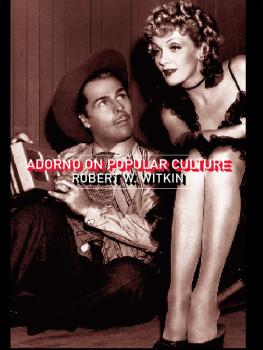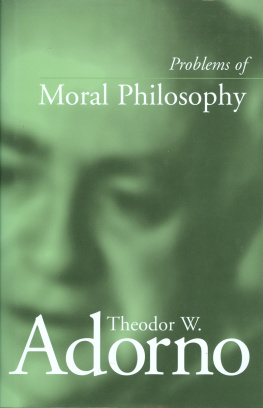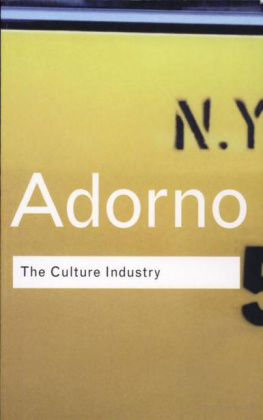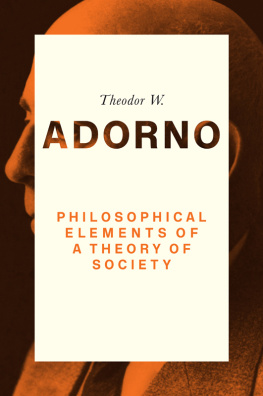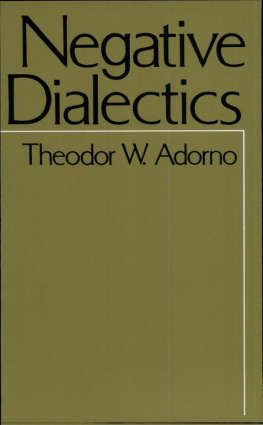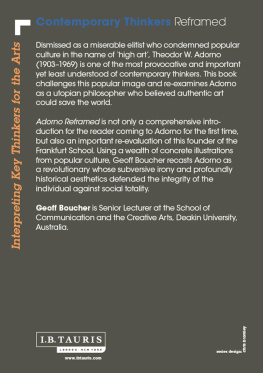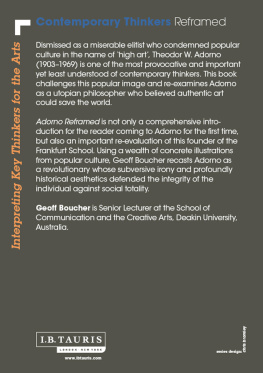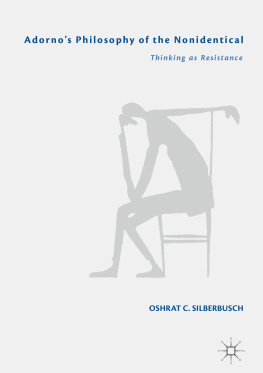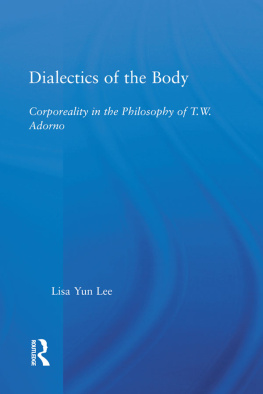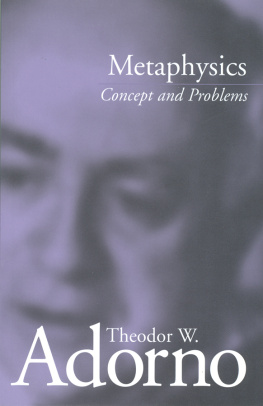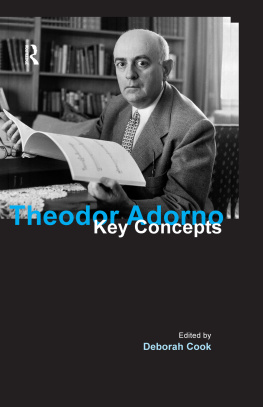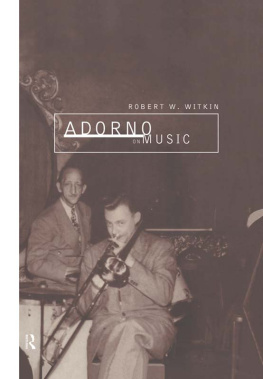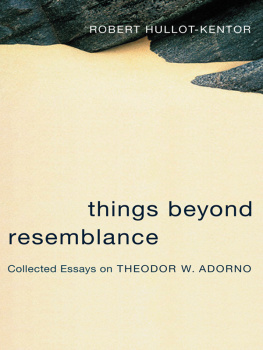Adorno Theodor W. - Adorno on Popular Culture
Here you can read online Adorno Theodor W. - Adorno on Popular Culture full text of the book (entire story) in english for free. Download pdf and epub, get meaning, cover and reviews about this ebook. City: Abingdon;Oxon, year: 2003;2011, publisher: Taylor & Francis (CAM);Routledge, genre: Religion. Description of the work, (preface) as well as reviews are available. Best literature library LitArk.com created for fans of good reading and offers a wide selection of genres:
Romance novel
Science fiction
Adventure
Detective
Science
History
Home and family
Prose
Art
Politics
Computer
Non-fiction
Religion
Business
Children
Humor
Choose a favorite category and find really read worthwhile books. Enjoy immersion in the world of imagination, feel the emotions of the characters or learn something new for yourself, make an fascinating discovery.
- Book:Adorno on Popular Culture
- Author:
- Publisher:Taylor & Francis (CAM);Routledge
- Genre:
- Year:2003;2011
- City:Abingdon;Oxon
- Rating:3 / 5
- Favourites:Add to favourites
- Your mark:
- 60
- 1
- 2
- 3
- 4
- 5
Adorno on Popular Culture: summary, description and annotation
We offer to read an annotation, description, summary or preface (depends on what the author of the book "Adorno on Popular Culture" wrote himself). If you haven't found the necessary information about the book — write in the comments, we will try to find it.
Adorno on Popular Culture — read online for free the complete book (whole text) full work
Below is the text of the book, divided by pages. System saving the place of the last page read, allows you to conveniently read the book "Adorno on Popular Culture" online for free, without having to search again every time where you left off. Put a bookmark, and you can go to the page where you finished reading at any time.
Font size:
Interval:
Bookmark:

In the decades since his death, Adornos thinking has lost none of its capacity to unsettle the settled, and has proved hugely influential in social and cultural thought. To most people, the entertainment provided by television, radio, film, newspapers, astrology charts and CD players seems harmless enough. For Adorno, however, the culture industry that produces them is ultimately toxic in its effect on the social process. He argues that modern mass entertainment is manufactured under conditions that reflect the interests of producers and the market, both of which demand the domination and manipulation of mass consciousness.
Here Robert W. Witkin unpacks Adornos notoriously difficult critique of popular culture in an engaging and accessible style. Looking first at its grounding in a wider theory of the totalitarian tendencies of late capitalist society, he then goes on to examine, in some detail, Adornos writing on specific aspects of popular culture such as astrology, radio, film, television, popular music and jazz. He concludes with his own critical reflections on Adornos cultural theory.
This book will be essential reading for students of the sociology of culture, of cultural studies, and of critical theory more generally.
Robert W. Witkin is Professor of Sociology at the University of Exeter and is the author of Adorno on Music (1998) and Art and Social Structure (1995).
University of Lancaster

First published 2003
by Routledge
11 New Fetter Lane, London EC4P 4EE
Simultaneously published in the USA and Canada
by Routledge
29 West 35th Street, New York, NY 10001
Routledge is an imprint of the Taylor & Francis Group
This edition published in the Taylor & Francis e-Library, 2004.
2003 Robert W. Witkin
All rights reserved. No part of this book may be reprinted or reproduced or utilised in any form or by any electronic, mechanical, or other means, now known or hereafter invented, including photocopying and recording, or in any information storage or retrieval system, without permission in writing from the publishers.
British Library Cataloguing in Publication Data
A catalogue record for this book is available from the British Library
Library of Congress Cataloging in Publication Data
Witkin, Robert W. (Robert Winston)
Adorno on popular culture / Robert W. Witkin.
p. cm. (International library of sociology)
Includes bibliographical references and index.
1. Adorno, Theodor W., 19031969. 2. Popular culture.
I. Title. II. Series.
B3199.A34 W58 2002
306.092dc21 2002069895
ISBN 0-203-16606-X Master e-book ISBN
ISBN 0-203-26067-8 (Adobe eReader Format)
ISBN 0-415-26824-9 (hbk)
ISBN 0-415-26825-7 (pbk)
Adorno on Popular Culture completes a critical review of Adornos writings on culture that began with the publication of my earlier book Adorno on Music. I would like to express my thanks to my good friend, Chris Rojek for his encouragement to me personally and his enthusiasm for the writings of Adorno. I am grateful to Mari Shullaw, the senior sociology editor at Routledge who agreed to take the project on and to find a space for the new volume in the ILS. Finally, I wish to express my thanks to the Leverhulme Trust for the award of a Major Research Fellowship (20013) which has provided me with a period of sustained research and writing time.
Most of the chapters of the present text centre themselves around a reading of an article sometimes more than one or a chapter of a book by Adorno. This was also the method of Adorno on Music. In both volumes, I opted to undertake a close reading of primary texts and to preserve, for the reader, so far as is possible, the sustained theoretical tension of Adornos argumentation in the specific writings chosen for discussion. There is inevitably a certain degree of thematic overlap among topics but that, too, is a feature of Adornos own writings which, like the music he admires, develop a great many variations from a very few basic themes.
It would be wrong, however, to see this book as a straightforward exposition of Adornos ideas. Notwithstanding the care I have taken to capture his line of argumentation, I have always had an agenda of my own that drives my interest in his writings. It will be apparent to the reader at key points in the text; for example, where I juxtapose Adornos ideas with those of others none of them, with the exception of Benjamin, is selected from the pantheon of theorists with whom he is usually associated. Some of these juxtapositions reveal the wider associations of Adornos cultural critique with the work of American critics, for example, David Riesman. Adorno is also confronted with himself in other guises as in the chapter in which a connection is drawn between the Dialectic of Enlightenment and Wagners Ring cycle. In the chapter on Popular Music Adornos arguments are brought up against the very different and in many ways opposed views of Winthrop I have brought Adornos work on radio and film into relationship with two movies that deal with popular culture of the period in which Adorno was writing, Woody Allens Radio Days and The Purple Rose of Cairo. In the final chapter, I have drawn even more directly on my own theorizing in order to put Adornos ideas under a degree of critical pressure and to complete the process of walking a critical line that I began in the final chapter of the previous volume.
There are other secondary works, many of them excellent, that discuss Adornos ideas on popular culture and music. There are books, too, that locate his ideas in the discourse universes of Marxism and Critical Theory to which he clearly belongs. If I have chosen a different approach to his work, it is largely because my method has been to narrow my focus in the exposition to a fresh reading of primary texts. Nevertheless, the secondary literature on Adorno has most certainly helped to shape my understanding of his work. In this regard, no-one will be surprised to see me name the following as those whose books have personally influenced me the most: Rose Subotnik (1990, 1996), Max Halle Paddison (1993), Martin Jay (1973), Susan Buck-Morss (1977), Gillian Rose (1978), Jay Bernstein (1993). There are other excellent secondary sources in addition to these (see Deborah Cook 1996).
Notwithstanding the critical agenda that is carried both implicitly throughout and explicitly in the latter part of this book and the disagreements I have with Adorno, which are significant, perhaps fundamental it will not escape the reader that this book, like its predecessor, is a critical appreciation of Adornos ideas with the accent on appreciation. I have learned too much from him for it to be otherwise.
Robert Witkin
Exeter, January 2002
CULTURAL NEMESIS
In the decades since his death, Adornos thinking has lost none of its capacity to unsettle the settled, to discomfort those who believe, implicitly or explicitly, that the world can be mastered, or even that they have a secure home in it. Adorno struck out against modern popular culture in all its forms. He spared nothing in his relentless critique. To most people, the comforts at the heart of modern living, the entertainment provided by television, radio, film, newspapers, astrology charts and CD players seem harmless enough. The media give pleasure, put people in touch with the wider world, provide amusement, excitement and entertainment, improve the access of all social classes to what were hitherto the cultural goods of the rich, relieve the boredom and loneliness of living alone and so forth. The best of their contents are genuinely popular. For Adorno, however, this popularity becomes part of the object of criticism. He challenges the notion that the elements of popular culture are harmless. He insists on treating popular culture as a deadly serious business, as something that is ultimately toxic in its effects on the social process. If the defenders of popular culture have not been persuaded by Adorno, they have often been discomforted by him, and his thesis, like a bone in the throat, still commands their attention.
Font size:
Interval:
Bookmark:
Similar books «Adorno on Popular Culture»
Look at similar books to Adorno on Popular Culture. We have selected literature similar in name and meaning in the hope of providing readers with more options to find new, interesting, not yet read works.
Discussion, reviews of the book Adorno on Popular Culture and just readers' own opinions. Leave your comments, write what you think about the work, its meaning or the main characters. Specify what exactly you liked and what you didn't like, and why you think so.

